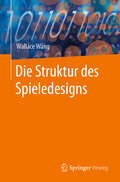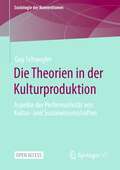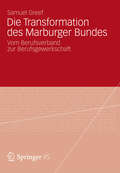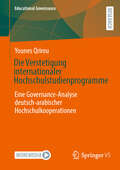- Table View
- List View
Die Radikale Rechte: Biopsychosoziale Wurzeln und internationale Variationen
by Klaus WahlDieses Buch analysiert den Anstieg von Fremdenfeindlichkeit, Rassismus und rechtsradikalen politischen Parteien, Bewegungen und gewalttätigen Gruppen in den letzten Jahren.Der Autor gibt einen Überblick über den aktuellen Stand der internationalen und interdisziplinären Forschung zu den vielschichtigen Erklärungen für rechtsradikales Gedankengut und vergleicht Ähnlichkeiten und Unterschiede in Europa und den Vereinigten Staaten. Durch die Integration von Erkenntnissen aus Psychologie, Geschichte, Sozial- und Lebenswissenschaften schlägt er ein biopsychosoziologisches Modell der Bedingungen, Ursachen, Katalysatoren und Auslöser von Phänomenen der radikalen Rechten in der ganzen Welt vor. Auf der Grundlage einer Analyse von "Nachfrage" und "Angebot" untersucht Wahl das Zusammenspiel von evolutionären emotionalen Mechanismen und Sozialisationsprozessen mit verschiedenen Umweltbedingungen und den daraus resultierenden Erscheinungsformen rechtsradikaler Gruppen, um Strategien zur Verlangsamung des Aufstiegs und der Auswirkungen der radikalen Rechten zu ermitteln.
Die Realität der Reform: Über Wahrnehmung und Wirklichkeit der Veränderung von Organisationen (Organisationsstudien)
by Marcel SchützVeränderungsprogramme zählen längst zum klassischen Projektrepertoire vieler Unternehmen, Banken, Verbände und Verwaltungen. Ihr Nutzen wird darin gesehen, betriebliche Komplexität auf ein handhabbares Maß zu reduzieren und organisatorische Zwecke im Hinblick auf umweltliche Erwartungen in neuartiger Weise zu begründen und auszurichten. Eine diesbezüglich rein zweckrational-instrumentelle Sicht vermag es jedoch nicht in Gänze, den tatsächlichen Erlebnis-, Entscheidungs- und Aktionshorizont entsprechender Veränderungsprojekte zu erfassen. Mit einer empirischen Forschung in einem größeren Finanzinstitut wird nachvollzogen, wie sich neben einer technisch-methodischen Seite des Projektmanagements ergänzend eine eigene ,Reformrealität‘ des Entscheidens ausbilden kann, deren Beitrag darin besteht, in der Organisation plausibilisierte Umwelterwartungen in anschlussfähiger Art und Weise zu konstruieren.
Die Realschule als Modell mittlerer Bildung: Geschichte, Bildungsgang, Kontroversen, Praxis
by Konrad FeesIn der vorliegenden Studie wird die Schulform Realschule in ihrer Besonderheit unter den Aspekten Historie, Bildungsgang, Schülerschaft, Lehrerbildung, Beschäftigungspolitik und Schulleistung untersucht und vorgestellt. Es wird gezeigt, dass die Realschule über Jahrzehnte erfolgreich eine solide Grundbildung mit einer anwendungsorientierten fachlichen und überfachlichen Bildung verband, die zum Eintritt in aussichtsreiche Laufbahnen in Technik, Handel, Dienstleistung und Verwaltung befähigte. Im Zuge der jüngeren Schulentwicklung mit veränderten Übergangsquoten und dem Aufkommen bildungsgangübergreifender Angebotsformen droht das bewährte Modell mittlerer Bildung allerdings obsolet zu werden. In dieser Situation ist eine Besinnung auf die Alleinstellungsmerkmale realer Bildung notwendig.
Die Rede von Bildung: Tradition, Praxis, Geltung - Beobachtungen aus der Distanz (Kindheit – Bildung – Erziehung. Philosophische Perspektiven)
by Heinz-Elmar TenorthBildung gehört zu den zentralen Begriffen der öffentlichen Debatte über die wünschenswerten Zukünfte von Individuen und Gesellschaft, über die Praxis des Bildungswesens und über Chancengleichheit und Bildungsgerechtigkeit. Gleichzeitig ist der Begriff mit Erwartungen überlastet und seine theoretische Qualität bestenfalls ungeklärt. Zur Prüfung von Status, Funktion und Geltung des Begriffs rekonstruiert der Band zunächst (I) die Tradition des Bildungsdenkens und die seither argumentativ verengte Praxis der Rede von Bildung. Gegen die Dominanz von Emphase, Skepsis und Kritik wird dann (II) demonstriert, dass und wie Bildung im Lebenslauf und im Bildungssystem möglich wird. Abschließend (III) wird kritisch geprüft, ob sich die Rede von Bildung auch als Bildungstheorie ausweisen kann. Redeform und Lebensform von Bildung haben, so das Fazit, zwar lebensweltliche, aber keine theoretische Geltung.
Die Regeln des Spiels: Programm und Spielplan-Gestaltung im Theater
by Thomas SchmidtDas Buch führt in die Grundlagen und Abläufe der Erstellung eines Theaterspielplans ein und beleuchtet dessen Bedeutung für die Programmierung und das Management von Theatern. Es füllt damit eine wichtige Lücke in der Theater- und Theatermanagement-Literatur. Schmidt untersucht die Spielplan-Gestaltung öffentlicher Theater auf der Grundlage von ausführlichen Spielplan-Analysen, zahlreichen Umfragen unter Dramaturgen und einer mehrjährigen Feldstudie. Aus den Ergebnissen entwickelt der Autor ein Modell der Spielplan-Gestaltung als zentrales künstlerisches und ökonomisches Managementinstrument des Theaters.Der Inhalt· Der Traum vom idealen Spielplan· Das deutsche öffentliche Theatersystem und das Stadttheater· Das Feld als kulturtheoretischer Rahmen des Theaters · Spielplan-Gestaltung in der Theaterpraxis – Eine empirische Untersuchung· Die Phasen der Spielplan-Gestaltung· Die Regeln des Spiels Die Zielgruppen · Studierende, Lehrende und Wissenschaftler in den Gebieten Kulturmanagement, Kultur- und Theaterwissenschaften, Dramaturgie, Regie, Schauspiel, Oper und Tanz· Mitarbeiterinnen und Mitarbeiter der Künstlerischen Leitungen und des Managements am Theater· Theaterinteressierte Menschen Der AutorThomas Schmidt ist Professor für Theatermanagement und Direktor des Studiengangs Theater und Orchestermanagement in Frankfurt am Main. Er war Gastprofessor an der Harvard-University, Gastdozent an verschiedenen anderen Universitäten und Geschäftsführender Direktor des Nationaltheaters Weimar.
Die Regelung der Gesundheitsversorgung Geflüchteter: Das Beispiel der Versorgung bei psychischen Erkrankungen
by Renate Reiter Thomas Gerlinger Annette Elisabeth Töller Constanze JandaDas Buch untersucht Regelungen, Formen, Reichweite und Triebkräfte der Bearbeitung der spezifischen psychiatrisch-psychotherapeutischen Versorgungsbedarfe von Geflüchteten in Deutschland. Dabei werden diverse regelungsbedürftige Problemfelder (z.B. Bedarfsermittlung, Sprachmittlung, Leistungsgewährung bzw. Leistungszugang mit oder ohne elektronische Gesundheitskarte, Rolle der Zivilgesellschaft etc.) auf der Bundes-, der Bundesländer- und der Kommunalebene sowie der Ebene der Zivilgesellschaft in den Blick genommen.
Die Resiliente Stadt: Konzepte, Konflikte, Lösungen
by Sigrun Kabisch Dieter Rink Ellen BanzhafResilienz ist das Konzept der Stunde. Die Coronakrise, die Flutkatastrophe im Ahrtal und die Energieknappheit haben Resilienz an die Spitze der politischen Agenda gesetzt. Auch für die Stadtentwicklung gilt Resilienz als Ziel. Doch was steckt hinter diesem relativ neuen Begriff? In diesem Open-Access Band erfahren die Leser*innen wie Städte auf Krisen und Katastrophen besser vorbereitet werden müssen, um diese gut zu überstehen und gestärkt aus ihnen hervorzugehen. Die Beiträge zeigen konkrete Beispiele, wie Städte resilienter gestaltet werden können.Welche Voraussetzungen müssen dafür geschaffen werden und welche Hindernisse gibt es? Für das Ziel urbaner Resilienz bedarf es rascher, tiefgreifender und systemischer Wandlungen auf allen Ebenen, von der Gesamtstadt bis zum Quartier oder der Nachbarschaft. Der Weg dahin und die entsprechenden Instrumente sind vielfach bekannt; dennoch wird bislang nicht mit der notwendigen Entschlossenheit vorgegangen. Dieser Band enthält empirisch belegte Beispiele aus der aktuellen Stadtforschung, zeigt Konflikte auf und diskutiert Lösungen. Die Beiträge analysieren, wie bestehende Einsichten zum Handeln führen und vorhandenes Wissen klug eingesetzt werden kann. Sie verweisen auch darauf, warum existierende Lösungsvorschläge nicht zum Einsatz kommen. Anhand der Betrachtung unterschiedlicher kommunaler Handlungsfelder wie blau-grüner Infrastrukturen, Energie- und Wärmewende, Umweltstressoren, Wohnen und Gesundheit wird ein tieferes Verständnis für die resiliente Stadt entwickelt. Das Werk richtet sich an Stadt- und Regionalplaner*innen, Geograph*innen, Stadtforscher*innen und Umweltwissenschaftler*innen sowie an Verantwortliche in Kommunalpolitik und -verwaltung.
Die Rolle der Familienkommunikation für die familiäre Resilienz: Eine theoretische und empirische Modellierung im Kontext der COVID-19-Pandemie
by Miriam JaspersenKrisen wie die COVID-19-Pandemie haben die Bedeutung familiärer Resilienz und Kommunikation in den Fokus gerückt. Insbesondere die Rolle der innerfamiliären Kommunikation wurde in der bisherigen Resilienzforschung jedoch noch nicht umfassend untersucht. Die Autorin entwickelt ein erweitertes Rahmenmodell familiärer Resilienz, das kommunikationswissenschaftliche, psychologische und soziologische Perspektiven integriert. Dabei werden kommunikative und sozialstrukturelle Schutz- sowie Risikofaktoren systematisiert. Mithilfe einer standardisierten Online-Befragung von Eltern wird analysiert, inwieweit sozialstrukturelle und kommunikative Faktoren im Kontext der COVID-19-Pandemie zur Anpassungsfähigkeit beigetragen haben. Die Ergebnisse zeigen, dass vor allem kommunikationsbezogene Faktoren entscheidend für funktionale und dysfunktionale Anpassungsprozesse sind. Die theoretischen und empirischen Erkenntnisse der Arbeit unterstreichen die Relevanz kommunikationsbezogener Resilienzfaktoren und liefern wichtige Impulse zur Stärkung familiärer Resilienz insbesondere in Zeiten globaler Unsicherheit.
Die Rolle der Führungskraft in agilen Organisationen: Wie Führungskräfte und Unternehmen jetzt umdenken sollten (essentials)
by Gernot Schiefer Hanna NitscheIn diesem essential werden Chancen und Hindernisse bei der Umsetzung agiler Personalführung fokussiert und Ansätze dargestellt, Führungskräfte bei dieser zentralen Aufgabe zu unterstützen. Die Autoren skizzieren die Herausforderungen einer Führungskraft, die ihren Mitarbeitern agile Denk- und Arbeitsweisen vorleben soll. Sie arbeiten heraus, wie die Unternehmensspitze und das Personalmanagement dazu beitragen können, dass Führungskräfte dieser Rolle gerecht werden. Nicht zuletzt wird auf die Abhängigkeit der Führungskultur von der Unternehmenskultur aus Sicht der Führungskräfte eingegangen.
Die Rolle der Mittelschichten im Arabischen Frühling: Ein Überblick (essentials)
by Rachid OuaissaDer Beitrag diskutiert die Rolle der Mittelschichten in den Transformationsprozessen der arabischen Welt in der jüngeren Geschichte. Rachid Ouaissa vertritt die These, dass die arabischen Mittelschichten zwar die Hauptträger von Protesten sind, jedoch keine strukturellen Druckmittel besitzen, um Demokratisierung durchzusetzen. Denn im Gegensatz zu den profitorientierten europäischen Mittelschichten sind die arabischen Mittelschichten klientelisiert und rentenorientiert.
Die Rolle des sozialen Umfeldes bei der Studienentscheidung (Higher Education Research and Science Studies)
by Barbara FrankeBarbara Franke thematisiert in dem vorliegenden Buch die Rolle des sozialen Umfeldes der Studienberechtigten im Prozess der Studienentscheidung. Basierend auf soziologischen Wert-Erwartungs-Theorien und unter Berücksichtigung psychologischer, sozialkapitaltheoretischer und netzwerktheoretischer Ansätze werden die Mitschüler*innen, Freund*innen, Eltern und weitere relevante Netzwerkkontakte als Einflussfaktoren betrachtet und das Zusammenspiel zwischen kontextualen und individuellen Merkmalen ermittelt. Die empirischen Befunde belegen die Relevanz des sozialen Umfeldes bei der Studienentscheidung. Die Normen und das Verhalten relevanter Bezugsgruppen stehen direkt und indirekt im Zusammenhang mit der Entscheidung, ob Studienberechtigte ein Hochschulstudium aufnehmen.
Die Rolle freiberuflicher Hebammen in Netzwerken Frühe Hilfen: Eine quantitative, egozentrierte Netzwerkanalyse
by Noreen Naranjos VelazquezRegionale Vernetzung von Angeboten Früher Hilfen erhöht die Wahrscheinlichkeit für gesundes und sicheres Aufwachsen von Kleinkindern. Aus sozialökologischer Perspektive ist anzunehmen, dass Interaktionen im Netzwerk abhängig sind vom Kontext und persönlichen Merkmalen. Erstmalig genutzt wurde die egozentrierte Netzwerkanalyse, um interprofessionelle Vernetzung freiberuflicher Hebammen im Rahmen einer Lokalstudie standardisiert zu untersuchen. Daten von Hebammen und Adressatinnen wurden mit Mehrebenenanalysen und multiplen linearen Regressionen statistisch ausgewertet.
Die Rollen der Angehörigen in der Gesundheitskommunikation: Modelle, Funktionen und Strategien
by Doreen ReifegersteIn diesem Buch werden die zentralen Rollen der Angehörigen in der Gesundheitskommunikation aus Modellen der Kommunikationswissenschaft, Psychologie, Soziologie und den Gesundheitswissenschaften abgeleitet. Darauf basierend werden Strategien der Angehörigenkommunikation vorgestellt, die unabhängig von bestimmten Krankheiten und Kommunikationskanälen zum Einsatz kommen. Dies trägt zum Verständnis der potentiellen positiven sowie negativen Wirkungen von Angehörigen in Kommunikationsprozessen bei und dient als Grundlage für die Entwicklung entsprechender Interventionen in der Gesundheitsversorgung.
Die Sozialstruktur Deutschlands im internationalen Vergleich
by Christian SteuerwaldNationale Sozialstrukturanalysen machen im Zeitalter der Globalisierung immer weniger Sinn. Daher wird in diesem Buch die Entwicklung der deutschen Sozialstruktur mit der anderer Länder verglichen. Im Mittelpunkt stehen dabei europäische Länder, in vieler Hinsicht werden aber auch außereuropäische, moderne und sich entwickelnde Länder einbezogen. Im Einzelnen werden Strukturen der Bevölkerung, der Haushalte und Familien, der Bildung und der Erwerbstätigkeit, der sozialen Ungleichheit, der sozialen Sicherung und der Lebensweisen einander gegenüber gestellt. Vergleichsmaßstäbe werden aus Modernisierungstheorien gewonnen.
Die Struktur des Spieledesigns
by Wallace WangDie Struktur des Spieledesigns soll angehenden und erfahrenen Spieleentwicklern helfen, ihre Ideen in funktionierende Spiele umzusetzen. Die Erstellung eines Spiels erfordert das Verständnis der grundlegenden Elemente aller Arten von Spielen, angefangen von papierbasierten Spielen bis hin zu den neuesten Videospielen. Durch das Verständnis, wie diese grundlegenden Prinzipien in allen Arten von Spielen funktionieren, können Sie dieselben Prinzipien anwenden, um Ihr eigenes Spiel zu entwerfen.Spiele handeln von Zielen, Struktur, Spiel und Spaß. Während jeder seine eigene Vorstellung davon haben wird, was "Spaß" sein könnte, kann jeder Spieleentwickler die Freude der Spieler maximieren, indem er bedeutungsvolle Entscheidungen anbietet, die verschiedene Risiken und Belohnungen mit sich bringen. Solche Herausforderungen, kombiniert mit Regeln und Einschränkungen, zwingen die Spieler, Hindernisse und Probleme mit verschiedenen Fähigkeiten wie Geschicklichkeit, Rätsellösung,Intelligenz und Strategie zu überwinden. Im Wesentlichen ermöglichen Spiele den Spielern, in neuen Welten voranzukommen und Probleme in einer sicheren, aber aufregenden Umgebung zu überwinden, die es ihnen ermöglicht, am Ende zu triumphieren.Genau wie das Spielen von Spielen weltweit bei allen Altersgruppen, Geschlechtern und Kulturen beliebt ist, erfreut sich auch das Game Design gleichermaßen großer Beliebtheit. Spiele können die Spieler herausfordern, den besten Zug zu machen, Rätsel zu lösen, sich im Kampf zu engagieren, Ressourcen zu verwalten und Geschichten zu erzählen. Indem man versteht, wie Zufall, Psychologie und Balance die Art und Weise beeinflussen können, wie Spiele gespielt werden, können die Leser entscheiden, welche Spielelemente am besten für ihre eigene Spielkreation geeignet sind.Ob Ihr Ziel darin besteht, Geld zu verdienen, etwas Neues zu lernen, eine soziale Aussage zu machen, eine bestehende Spielidee zu verbessern oder Ihre künstlerischen, programmierenden oder gestalterischen Fähigkeiten zu testen, kann das Game Design genauso viel Spaß machen wie das Spielen von Spielen. Indem Sie die Teile eines Spiels kennen, wie sie funktionieren, wie sie interagieren und warum sie Spaß machen, können Sie Ihr Wissen nutzen, um jede Idee in ein Spiel zu verwandeln, das andere spielen und genießen können.
Die Subjekte der Islampolitik: Beiträge zu einer Soziologie des Islams (Veröffentlichungen der Sektion Religionssoziologie der Deutschen Gesellschaft für Soziologie)
by Levent TezcanEs war ein fataler Fehler von Wissenschaftlern und politischen Beobachtern, in den islamistischen Bewegungen Vertreter einer scheinbar „authentischen“ Modernisierung zu sehen und dadurch an der Delegitimierung der säkularen Kräfte in den muslimischen Ländern und Milieus als „kulturfremde Eliten“ mitzuwirken. An diese Fehldeutung knüpft auch die paradigmatische Entscheidung der Regierungen in Europa resp. in Deutschland an, bei der Integrationspolitik auf die Religion umzusatteln. Die Beiträge in diesem Band problematisieren die Fundamentalisierung des Islam unter den Migranten und die religiöse Wende in der Integrationspolitik.
Die Theorien in der Kulturproduktion: Aspekte der Performativität von Kultur- und Sozialwissenschaften (Soziologie der Konventionen)
by Guy SchweglerKultur- und sozialwissenschaftliches Wissen hat über die letzten 50 Jahre eine beständige Verbreitung erfahren und wurde zu einem festen Bestandteil gegenwärtiger Gesellschaften. Dies bezieht sich allerdings nicht nur auf die Ergebnisse der Disziplinen, sondern trifft im besonderen Maße auf deren grundlegende theoretische Konzepte zu. In verschiedensten gesellschaftlichen Bereichen repräsentiert dieses Wissen eine Ressource für die Akteur*innen, um Produktionsprozesse anzuleiten. Die Theorien liefern daher nicht nur Beschreibungen des Sozialen, sondern sie wirken „performativ“. Diese Open-Access-Publikation fokussiert auf den Bereich der Kulturproduktion und zeigt auf, welche Bedingungen zur Verwendung der theoretischen Konzepte außerhalb der Wissenschaft geführt haben, wie die Theorien in Prozessen zur Anwendung kommen und welche Veränderungen daraus folgen. Hierzu wird zuerst ein konzeptioneller sowie methodologischer Rahmen präsentiert, bevor die empirische Studie einer Kulturwelt detaillierte Einblicke in die Wirkungsweisen ermöglicht. Anhand der so verdeutlichten Aspekte der Performativität von kultur- und sozialwissenschaftlichen Theorien lässt sich schlussendlich aufzeigen, wie Kulturproduktion in gegenwärtigen Gesellschaften eine zentrale Stellung einnehmen konnte.
Die Transformation des Marburger Bundes
by Samuel GreefDie streikenden Krankenhausärzte sorgten 2005 für großes Aufsehen. Ihre Forderung nach höherer Entlohnung und besseren Arbeitsbedingungen wurde von dem der breiten Öffentlichkeit kaum bekannten Marburger Bund unterstützt. Zuvor hatte ver.di als Multi-Branchengewerkschaft alle Beschäftigten im Krankenhaus vertreten. Dem Ärzteverband gelang es im Nachgang der Streiks, eigenständige, arztspezifische Tarifverträge durchzusetzen. Damit veränderte sich die etablierte, tarifpolitische Akteurskonstellation in den Arbeitsbeziehungen im Krankenhaussektor. Zugleich transformierte sich der Marburger Bund von einem berufspolitisch orientierten Standesverband zu einer Berufsgewerkschaft. Samuel Greef zeigt die Hintergründe des Ärztestreiks auf und analysiert den Transformationsprozess des Marburger Bundes sowie dessen Erfolgsbedingungen.
Die Transnationalisierung der Arbeitswelt am Beispiel von Erwerbsmobilität in der Europäischen Union
by Torben KringsDieses Buch untersucht den Bedeutungswandel innereuropäischer Erwerbsmobilität im 21. Jahrhundert. Im Mittelpunkt stehen die Triebkräfte, die Arbeitsmarktauswirkungen und die Regulierung dieser Mobilität. Es wird gezeigt, dass es in den „postindustriellen“ Gesellschaften Westeuropas eine Nachfrage nach Arbeitskräften mit unterschiedlichen Qualifikationen gibt. Diese Nachfrage wird vor allem durch Zuwanderung aus der erweiterten EU bedient. Allerdings handelt es sich hierbei nicht mehr um die klassische Arbeitsmigration, sondern um die Mobilität von Unionsbürger/innen. Dies bringt neue Gelegenheiten mit sich, aber auch Herausforderungen in einem transnationalen Mobilitätsraum, der auch ein Ungleichheitsraum ist.
Die Universität im Feld der Macht: Zur Konstruktion von Expertise in der US-amerikanischen Wissensgesellschaft (Organization & Public Management)
by Oliver WieczorekDer Band hat zum Ziel, den Zugang wissenschaftlicher Experten zum Feld der Macht in theoretischer wie methodischer Sicht greifbar zu machen. Die USA als weltweit führender Wissenschaftsstandort mit zahlreichen Verflechtungen zwischen Wissenschaft, Politik, Ministerien, Wirtschaft, Stiftungen, Medien und Militär dient dabei als Anwendungsfall. Basierend auf einer Kombination aus Habitus-Feldtheorie und Netzwerktheorie wird ein Zugangsmaß entwickelt, das zugleich die Konkurrenz der Forschenden und Universitäten um Aufmerksamkeit sowie das Potential erfasst, Expertise in politische Entscheidungsprozesse einfließen zu lassen. Mittels eines Mixed-Methods-Forschungsdesigns, das die materiellen und symbolischen Ressourcen der Universitäten, deren strategische Ausrichtung und feldüberspannende Netzwerke erfasst und miteinander kombiniert wird deutlich, dass eine hohe Konzentration des Zugangs auf wenige Eliteuniversitäten vorliegt. Weiterhin zeigt sich, dass das Zugangsmaß ein sehr guter Prädiktor dafür ist, dass Expert*innen der jeweiligen Universitäten zu Kongress- und Senatsanhörungen vorgeladen werden. Vor diesem Hintergrund stellt sich das entwickelte Zugangsmaß und die unterliegende theoretische Fundierung als Grundlage dar, den allgemeinen Zugang von Akteuren zu Schaltstellen der Macht zu untersuchen.
Die Unmittelbarkeit sozialer Interaktion (essentials)
by Werner PfabIn dem Buch wird auf einen bislang in der Forschung vernachlässigten Aspekt sozialer Kommunikation aufmerksam gemacht: das unmittelbare Erleben in Kommunikation. Dieses Erleben erfolgt vorbewusst und leibbezogen. Es ist auch für die Ebene bewussten Verhaltens in Kommunikation bestimmend. Die grundlegende Bedeutung dieser Unmittelbarkeit für ein vertieftes Verständnis von Kommunikation wird herausgearbeitet und am Beispiel von Coaching veranschaulicht. Die Erfassung dieser Unmittelbarkeit bedarf einer neuen Darstellungsmethode. Diese kann sich an den Texten Siegfried Kracauers orientieren.
Die Verfassungsgerichtsbarkeit in der vernetzten Weltordnung: Rechtsprechungskoordination in rechtsordnungsübergreifenden Richternetzwerken (Beiträge zum ausländischen öffentlichen Recht und Völkerrecht #293)
by Andrej LangDieses Buch analysiert grundlegend die Rechtsprechung nationaler und supranationaler Verfassungsgerichte in Mehrebenenordnungen. Anknüpfend an den Verfassungspluralismus und die Netzwerktheorie entwickelt es mit „Konstitutionalismus im Netzwerk“ ein verfassungstheoretisches Modell der Rolle der Verfassungsgerichtsbarkeit jenseits des Nationalstaats. Es erklärt, wie sich Verfassungsgerichte durch richterrechtliche Normbildungsprozesse auf ein europäisches und globales Gemeinverfassungsrecht verständigen. Auf dieser Folie untersucht das Buch rechtsvergleichend rechtsordnungsübergreifende Rechtsprechungsentwicklungen zum Verhältnis zwischen den Rechtsordnungen, etwa zur Bindungswirkung internationaler Gerichtsurteile, zur Kontrolle völkerrechtlicher Gründungsverträge, zur Verfassungsidentität, zum Solange-Grundsatz und zur Ultra-Vires-Kontrolle und erörtert, inwieweit sich diese als Bausteine für eine nach den Prinzipien des Konstitutionalismus zu gestaltende vernetzte Weltordnung eignen.
Die Verstetigung internationaler Hochschulstudienprogramme: Eine Governance-Analyse deutsch-arabischer Hochschulkooperationen (Educational Governance #59)
by Younes QrirouAufgrund der politischen Umwälzungen der letzten zwanzig Jahre __ in der Region Mittlerer Osten und Nordafrika (MENA) gewann die deutsch-arabische Hochschulzusammenarbeit eine strategische Bedeutung für die deutsche Entwicklungspolitik. Der Deutsche Akademische Austauschdienst (DAAD) unterstützte zwischen 2005 und 2020 den Aufbau von zehn kooperativen Studienprogrammen mit Partneruniversitäten in Ägypten, Jordanien und dem Libanon. Diese Programme hatten das Ziel, einen entwicklungspolitischen Impact in Bereichen wie nachhaltige Stadtentwicklung, integriertes Wassermanagement, Förderung erneuerbarer Energien sowie wirtschaftlicher und politischer Transition zu erzielen. Bisher fehlen theoretisch fundierte Untersuchungen zur komplexen Durchführung solcher Studienprogramme. Diese Studie untersucht aus organisationstheoretischer Perspektive, wie Kooperationspartner gegenseitiges Vertrauen aufbauen, institutionelle Legitimität erlangen und Ressourcenabhängigkeit umgehen können, um internationale Hochschulstudienprogramme nach der Gründungsphase zu verstetigen. Mittels umfassender Dokumenten- und Interviewbasierte Analyse der Bedingungen der Entstehung und Umsetzung der Studienprogramme werden Mechanismen der kooperativen Governance identifiziert, die die Programmverstetigung fördern. Abschließend typisiert die Studie Organisationsformen deutsch-arabischer Hochschulkooperationen und gibt Empfehlungen für Initiatoren und Förderer kooperativer Studienprogramme.
Die Verwaltung im Home-Office: Wie sich Führungsverhalten auf das freiwillige Engagement von Mitarbeitenden auswirkt (BestMasters)
by Luise KrompholzDie umfangreichen Kontaktbeschränkungen und Infektionsschutzmaßnahmen zur Eindämmung der Corona-Pandemie hatten und haben noch immer einen erheblichen Einfluss auf die Gesellschaft – egal ob im privaten, wirtschaftlichen oder öffentlichen Bereich. Im Arbeitskontext kommt es dadurch in vielen Sektoren, vorrangig im Bereich der Wissensarbeit, zur Arbeit außerhalb der üblichen Arbeitsstätte. Dies trifft auch auf den öffentlichen Sektor und seine Verwaltung zu. Insbesondere in den Zeiten des Lockdowns waren so viele Verwaltungsmitarbeitende im Home-Office tätig wie nie zuvor in Deutschland. Bisher zeigte sich in der Verwaltung wenig Anwendung moderner Arbeitsmodelle, insbesondere bei der Flexibilisierung von Arbeitszeit und Arbeitsort. Aufgrund der Pandemie kam es zum „sozialen Experiment“ und neue Arbeitsmodelle mussten zwangsläufig ausprobiert werden. In diesem Buch wird untersucht, wie sich im Kontext der Verwaltung Führungsverhalten in Hinblick auf eine erfolgreiche Arbeit im Home-Office auswirkt. Das Ziel ist es, konkretes Verhalten zu identifizieren und zu beschreiben, an dem sich Führungskräfte orientieren bzw. messen können.
Die Vogelsang-Schule
by Justin StaglDas Buch untersucht die historische Dynamik der Lehre des katholischen Sozialreformers Karl von Vogelsang. Es folgt dem Denken und Wirken dreier Generationen seiner Schüler zwischen 1880 und 1960 in der österreichischen Monarchie, der Ersten und der Zweiten Republik und in der Weltkirche .Es behandelt dabei die konservative Kritik an Liberalismus und Kapitalismus, den föderalistischen Korporatismus, den Laizismus in der Kirche mit dem politischen, sozialen und kulturellen Katholizismus und die Reaktion darauf im Integralismus, die Entstehung „christlich-sozialer“ Parteien, eine konservierende Haltung zur Natur und gewachsenen Sozialbeziehungen, schließlich auch den Antijudaismus.
























